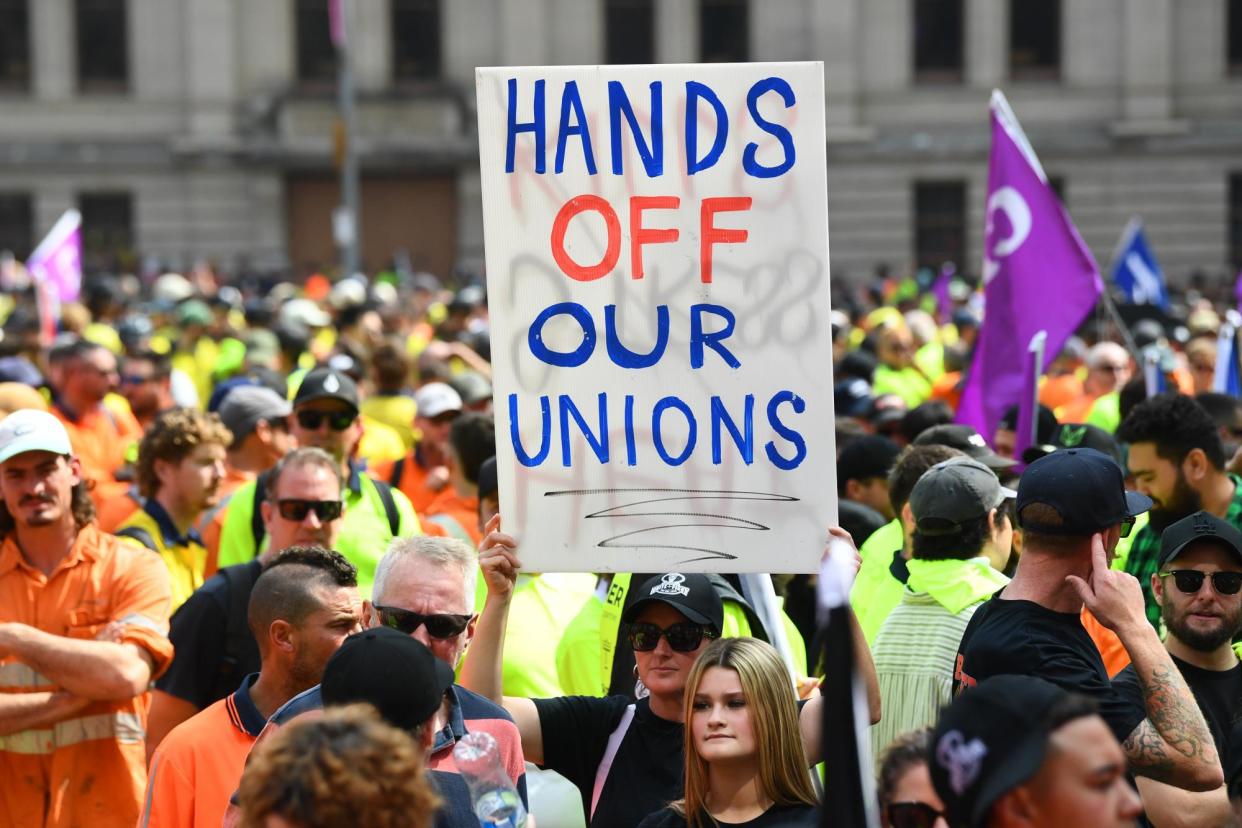Builders and the Fair Work Commission are delaying CFMEU members’ pay deals, union leader says

Blue-collar unions have taken aim at builders and the Fair Work Commission for delays approving pay deals struck before allegations of criminal misconduct and bikie links resulted in the construction union being placed into administration.
Troy Gray, the Electrical Trades Union Victorian secretary, said it was “appalling” that administrators have removed three union-appointed directors from the board of industry super fund Cbus and that enterprise agreements “aren’t getting through” the FWC.
He characterised both as part of a “tsunami of shit” that construction workers and union officials have suffered since adverse media reporting which resulted in Labor and the Coalition teaming up to create powers to appoint an administrator.
A spokesperson for the CFMEU administrator warned administration was “not an opportunity for employers to try to walk away” from existing pay deals or to “delay members gaining access to improve wages and conditions under new” ones.
Before reports in the Nine newspapers, the Construction, Forestry and Maritime Employees Union had reached pay deals delivering pay rises of 22% over five years in New South Wales, 20% in Victoria and 26% in Queensland.
On 30 July the FWC president, Adam Hatcher, noted “recent media reports” may involve conduct that contravenes the Fair Work Act and called into question whether pay deals were genuinely agreed by employees and employers.
Hatcher asked for “interested parties to provide additional information”, “raise concerns or lodge submissions”. The FWC promised to “continue to approve applications where satisfied that the requirements of the FW Act have been met” but noted that it “may take some additional time” to decide whether to approve deals.
Progress of CFMEU pay deals, published by the FWC, shows that 77 agreements lodged between 14 June and 2 August remain under the FWC “member consideration”. A further 32 agreements lodged from 4 August to 23 August are under “initial assessment”.
According to the FWC the median timeframe for approvals in 2023-24 was just 16 days, with 95% of deals approved within 32 working days.
ETU pay deals are unaffected but Gray has come out strongly in support of the CFMEU’s right to due process before administrators were appointed and for its pay deals to be approved.
“The Fair Work Commission is acting like judge, jury and executioner,” he said.
“We would call on them to endorse those agreements and pay workers the wages and conditions they deserve.
“It’s been more than 12 months since CFMEU members had their last pay rise.”
Gray said the average construction worker was a 34-year-old bloke, with two kids and a $700,000 mortgage, arguing the FWC was delaying a “cost-of-living pay rise”.
“There is genuine anger and frustration among 10,000s of construction workers, the Victorian construction industry is a tinderbox.”
After 60,000 workers turned out to rally in Melbourne on Tuesday, Gray confirmed planning was in the works for another day of action.
A spokesperson for the CFMEU administrator said it “expects the FWC to approve construction EBA’s as quickly as possible” and there should be “no delays”.
“It is the administrator’s understanding that the FWC has committed extra resources to ensure prompt processing of EBAs.
“The administrator has taken steps to enable the prompt filing of EBAs in the usual manner.”
The Master Builders Association of New South Wales has been campaigning against new pay deals, warning certain clauses are a “Trojan horse” for more union control and questioning “can Australians really afford an increase of at least 20% to construction costs”, a figure disputed by the union.
Brian Seidler, the executive director of Master Builders NSW, said it was “absolutely false” that the peak body’s campaign was directed at rejecting new deals or reopening concluded deals containing the 22% pay rise.
Seidler said the campaign was directed at clauses the union had said were non-negotiable such as control over which sub-contractors were employed, which no employer would have “freely agreed”.
Seidler, who is also a director of the Australian Construction Industry Redundancy Trust, claimed that employees wanted to revisit agreements requiring redundancy funds be paid into Incolink, a workers’ entitlement fund which the trade union royal commission found had distributed millions of its earnings to union and employer organisations.
Related: The Coalition says the CFMEU is blowing out construction costs. Is that really true?
“There is a great appetite in industry generally for revisiting those clauses that interfere with business,” he said.
“But I know of no contractor talking about changing pay rates, nor super, nor travel allowance, nor redundancy, except for the clause to give employees the choice of where their redundancy money goes.”
Paul Bidwell, the chief executive of Master Builders Queensland, said most of the CFMEU’s pay deals in that state had already been processed, but he had advised a few members that they “might be able to revisit it”.
Bidwell insisted this effort was limited to ensuring that “some of the more egregious conditions were watered down”, including getting more flexibility about when 26 registered days off are taken, and removing union veto over timing of work such as concrete pours.
The CFMEU administrator said “attempts by anyone to weaken the fundamental rights of workers to collectively bargain in the construction industry will be strongly resisted”.


